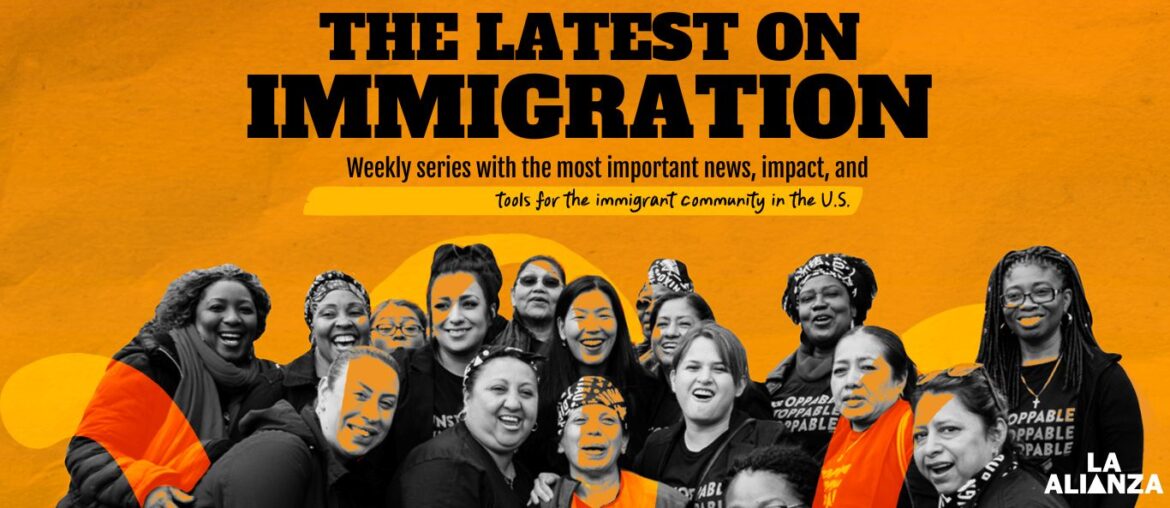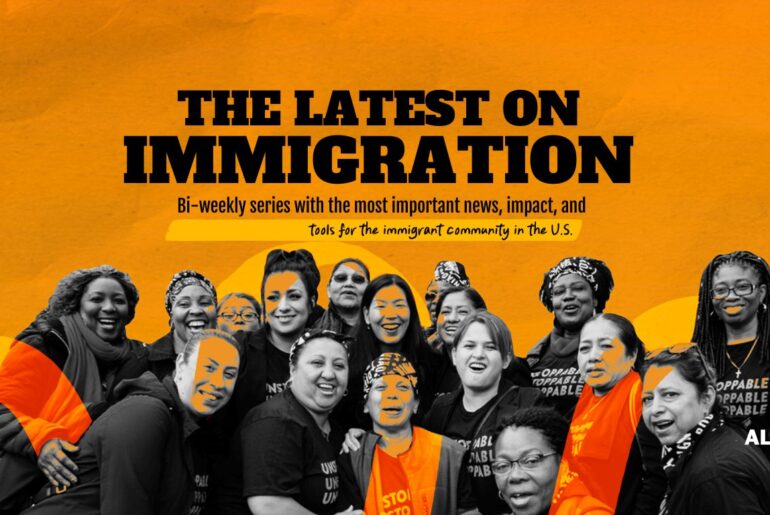This is a summary of the most important immigration news from April 17 to 30, 2025. During this period, the United States government continued to harden its migration policy with mass exit orders for migrants, a new offensive against sanctuary cities and deportation acceleration measures. There have also been local investments in rights campaigns and mass detention operations.
Recent News
Government sends mass emails ordering voluntary self-deportation from the country in 7 days: Hundreds of immigrants, including people with legal status, received letters indicating that they should leave the United States immediately.
- What we know: The Department of Homeland Security (DHS) sent mass notifications announcing the end of humanitarian parole for people who entered the country under the CBP One Program. Some emails were mistakenly sent to people with permanent residency (green card status), refugees and immigration lawyers.
- Why this is important: Many migrants run the risk of negatively affecting their immigration proceedings if they abandon the country without first consulting with a lawyer. The mass errors have also generated confusion and fear in vulnerable communities.
- What you can do: It’s crucial to not leave the country without first receiving legal counsel. You can access the NDWA attorney directory (NDWA is the partner organization of La Alianza), at the following link: https://www.domesticworkers.org/resources/immigrant-rights/find-legal-help/?lang=es. There you can find information about where to access legal aid near your home.
- Impact on immigrant communities: The lack of clarity generates panic, can interrupt ongoing legal processes and increase the risk of unjust deportations.
Trump orders refusal of asylum without an arraignment: An internal directive instructed immigration judges to reject asylum applications without arraignments.
-
- What we know: According to the Vera Institute of Justice, this measure seeks to accelerate deportations, but legal organizations warn that it could violate due process. The policy, in force since April 11th, allows judges to issue deportation orders without permitting the applicants to present their testimony in an arraignment. The measure seeks to reduce the accumulation of cases in immigration courts, which currently exceeds four million.
- Why this is important: Limiting arraignments could accelerate deportations for people that have protection rights under asylum laws. It also increases the risk of errors in cases of applicants without legal representation.
- What you can do: It is recommended that those who have pending asylum cases seek legal counsel as soon as possible. The American Civil Liberties Union (ACLU) has a practical guide about immigrant rights, including what to do if you are stopped by Immigration and Customs Enforcement (ICE) officers.
The Supreme Court stops deportations under the Alien Enemies Act: The highest court temporarily suspended non-Salvadorian migrant deportations to El Salvador under a 1798 law, while it analyzes an emergency resource presented by civil organizations.
- What we know: On April 19th, the court ordered a stop to deportations while it analyzes an emergency resource presented by the American Civil Liberties Union (ACLU). The lawsuit alleges that the migrants, mainly Venezuelans, faced the risk of being sent to a mega-prison, reported by organizations as having human rights violations, in El Salvador without access to a judicial review.
- Why this is important: The suspension protects, for now, people who could have been deported without arraignments, affecting their right to due process. It also limits the extraordinary use of a law that has rarely been applied in recent history.
- What you can do: Migrants at risk should seek legal counsel to know their options depending on their specific case. We also recommend having a family emergency plan in place to be able to activate the defense of their person if they were detained, you can access a model emergency plan at the NDWA webpage: https://www.domesticworkers.org/resources/immigrant-rights/?lang=es#how_do_i_create_a_family_preparedness_plan.
Judge blocks Trump measure to cut funds to sanctuary cities: A federal court suspended an order that tried to remove resources from 16 cities and counties, such as San Francisco and Seattle, due to protecting immigrants. The decision stops cuts that had affected essential services while the litigation proceeds.
- What we know: Federal Judge William Orrick prohibited the government from conditioning federal funds to cooperation in immigration matters, emphasizing that Trump’s executive orders were unconstitutional. Among the defendants are San Francisco, Santa Fe, Seattle and other cities that limit their collaboration with ICE.
- Why this is important: The resolution protects hospitals, schools and community programs that depend on federal funds, and reaffirms the autonomy of local governments to decide how to interact with federal immigration authorities.
- What you can do: Affected communities will continue to offer services without changes, for now. Immigrants are recommended to stay informed through their cities’ or counties’ official channels.
Developing Stories and Regional News
These are local stories and legislation that to this date are being implemented or in the pipeline:
- Trump signed three new executive orders: The measures intensify the pressure on sanctuary cities that limit immigration cooperation, bolster legal backing to local police and demand that truckers have English proficiency. Furthermore, the administration will condition federal funds to comply with immigration policies and will begin to require biometric enrollment for immigrants older than 14.
- Trump’s approval falls on immigration issues: Recent polls show that the majority of Americans disapprove of his immigration management, especially after errors in recent deportations.
- Three child citizens are deported along with their mothers: Three children born in the United States were deported along with their immigrant mothers. The deportations happened after the mothers, who had final deportation orders, attended scheduled appointments with Immigration and Customs Enforcement (ICE). According to the Department of Homeland Security, the mothers chose to take their children with them, but lawyers and advocates argue that they were not offered an alternative so that the minors could remain in the U.S. One of the deported children suffers from cancer and was deported without their medication and could permanently lose access to their medical treatment and team of medical specialists.
- New York pushes immigrant rights campaign: The New York City Mayor’s Office of Immigrant Affairs (MOIA) announced an investment of more than $630,000 for an education campaign that informs immigrants about their rights when faced with federal authorities. The campaign seeks to guarantee that all immigrants can access health, education and safety services without fear. You can visit the official website: https://spanish.translate.nyc.gov/site/immigrants/legal-resources/know-your-rights-federal-immigration-enforcement-ice.page to know your rights and access legal assistance in your language.
- Detentions in immigration appointments increase: Lawyers report an increase in immigrant arrests during arraignments in courts and routine interviews, even in cases of people without criminal records. The tendency has given rise to worries among advocates, who warn that attending scheduled appointments could now represent a major detention and deportation risk.
- DOGE builds deportation database: The Department of Government Efficiency works with Palantir Technologies to create mass immigrant data logging, facilitating arrest and deportation operations.
- Florida Judge orders a stop to immigrant arrests: The Attorney General instructed police to stop the arrests while proceedings are resolved against a law that criminalizes immigrants who enter the state without inspection; Attorney General James Uthmeier ordered state security agencies to stop detentions based on the new law against undocumented immigrants.
The Numbers
- 114 people arrested in a Colorado operation, according to DEA data.
- Almost 800 immigrants were detained in Florida in four days, in one operation.
Resources
- For more help, visit the National Domestic Workers Alliance’s “Know Your Rights” hub. It includes immigrants’ rights, immigration options, and a legal aid directory, among other resources. To access the information, visit ndwa.us/immigrant.
Note: The National Domestic Workers Alliance is the partner organization of La Alianza
- To identify reliable information, visit: How to identify fake news about immigration and avoid misinformation.
Legal Disclaimer: This information is provided for educational purposes and does not constitute legal advice. It is recommended that you consult with an immigration attorney to assess your specific situation.


